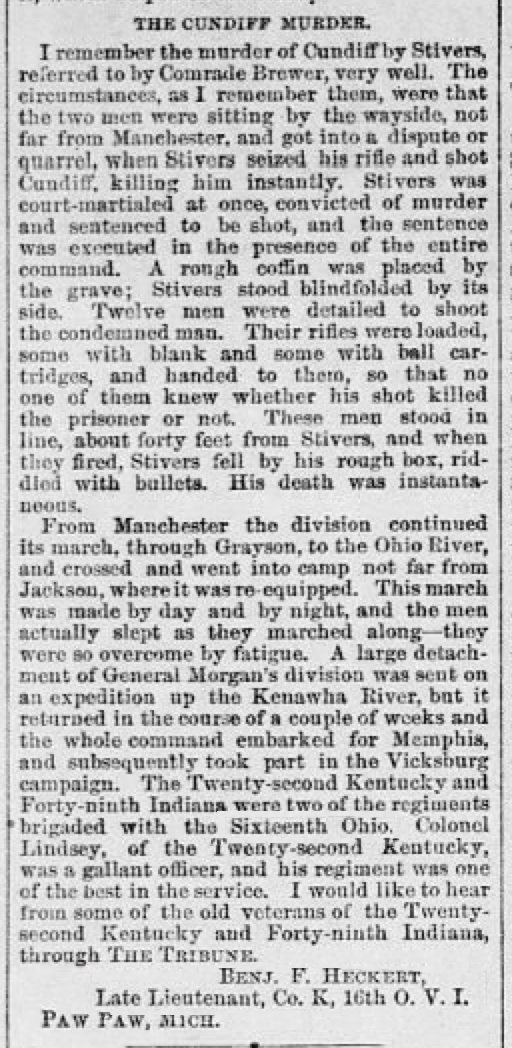| Previous Facts & Stories | Facts & Stories Index | 16th OVI Home Page | Next Facts & Stories |
of the 16th Ohio Volunteer Infantry
3rd Kentucky Volunteer Infantry
Manchester, Kentucky
September 21, 1862
The 16th Ohio was the first regiment to evacuate Cumberland Gap in advance of a full retreat by Gen. George Morgan's occupying Union force. The main force joined the 16th Ohio in Manchester, Kentucky. The night before the assembled troops began their arduous march north toward Ohio and safety a typical soldiers' argument turned deadly. Pvt. Lewis Stivers of the 7th Kentucky, said to be intoxicated, became upset at a fellow soldier, Pvt. James Cundiff, during a card game. Stivers shot Cundiff with his musket, killing him. Military justice was swift and the 16th Ohio played a major role in the outcome. Here are two versions of the story, one told by Pvt. Frank Mason of the 42nd Ohio (brigaded with the 16th Ohio) in his historical account of his Civil War experiences written after the war, and the other by 16th Ohio Lt. Benjamin Heckert, Company K, more than 20 years later in an article in the National Tribute published August 30, 1883.
Thanks to 16th Ohio researcher Rob Garber for the Heckert article. Rob is the 3rd great nephew of Capt. William Buchanan, Company F, and has provided much research and contribution to this website.
From The Forty-Second Ohio Infantry - A History of the Organization and Services of That Regiment In the War of the Rebellion, 1876 - F. H. Mason, late Private of Company A - Cobb, Andrews & Co., Publishers |
|
|
|
From The National Tribute, August 30, 1883 
|
THE CUNDIFF MURDER. I remember the murder of Cundiff by Stivers, referred to by Comrade Brewer, very well. The circumstances, as I remember them, were that the two men were sitting by the wayside, not far from Manchester, and got into a dispute or quarrel, when Stivers seized his rifle and shot Cundiff, killing him instantly. Stivers was court-martialed at once, convicted of murder and sentenced to be shot, and the sentence was executed in the presence of the entire command. A rough coffin was placed by the grave; Stivers stood blindfolded by its side. Twelve men were detailed to shoot the condemned man. Their rifles were loaded, some with blank and some with ball cartridges, and handed to them, so that no one of them knew whether his shot killed the prisoner or not. These men stood in line, about forty feet from Stivers, and when they fired, Stivers fell by his rough box, riddled with bullets. His death was instantaneous. From Manchester the division continued its march, through Grayson, to the Ohio River, and crossed and went into camp not far from Jackson, where it was re-equipped. This march was made by day and by night, and the men actually slept as they marched along--they were so overcome by fatigue. A large detachment of General Morgan's division was sent on an expedition up the Kenawha River, but it returned in the course of a couple weeks and the whole command embarked for Memphis, and subsequently took part in the Vicksburg campaign. The Twenty-second Kentucky and Forty-ninth Indiana were two of the regiments brigaded with the Sixteenth Ohio. Colonel Lindsey, of the Twenty-second Kentucky, was a gallant officer, and his regiment was one of the best in the service. I would like to hear from some of the old veterans of the Twenty-second Kentucky and Forty-ninth Indiana, through THE TRIBUNE. BENJ. F. HECKERT, Late Lieutenant, Co. K, 16th O.V.I. PAW PAW, MICH. |
| Previous Facts & Stories | Facts & Stories Index | 16th OVI Home Page | Next Facts & Stories |